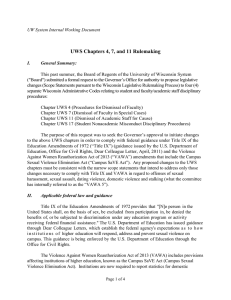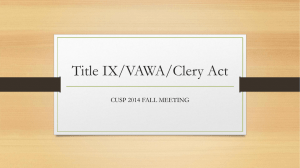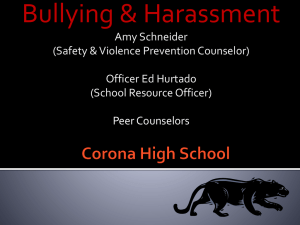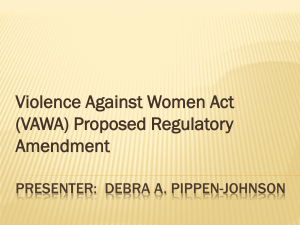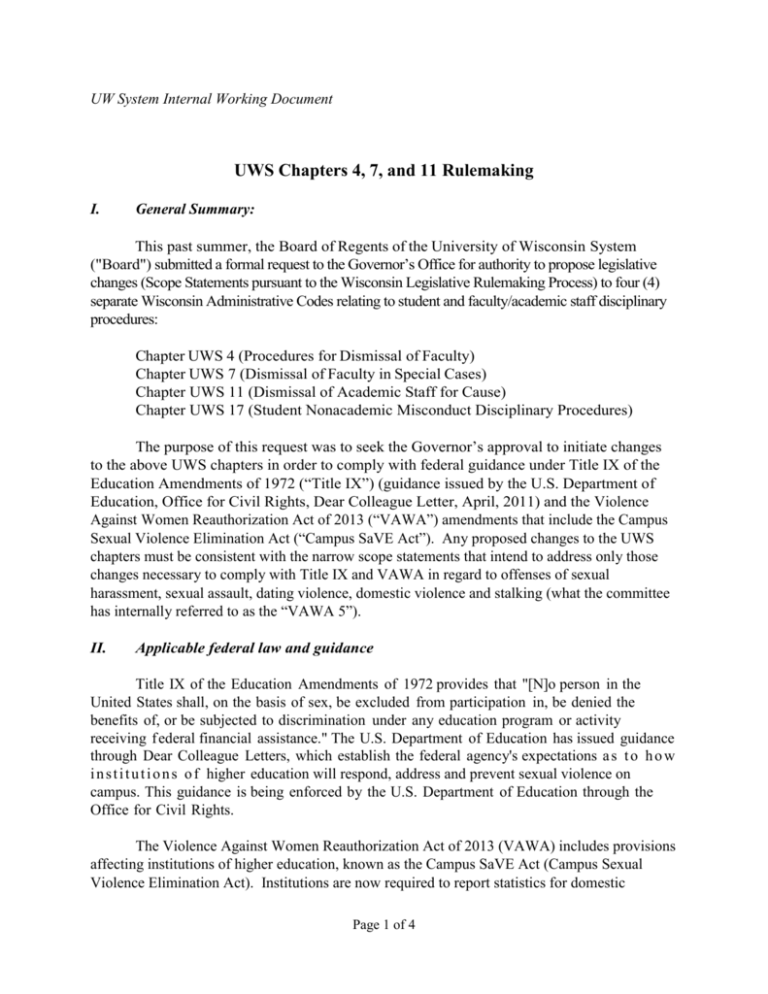
UW System Internal Working Document
UWS Chapters 4, 7, and 11 Rulemaking
I.
General Summary:
This past summer, the Board of Regents of the University of Wisconsin System
("Board") submitted a formal request to the Governor’s Office for authority to propose legislative
changes (Scope Statements pursuant to the Wisconsin Legislative Rulemaking Process) to four (4)
separate Wisconsin Administrative Codes relating to student and faculty/academic staff disciplinary
procedures:
Chapter UWS 4 (Procedures for Dismissal of Faculty)
Chapter UWS 7 (Dismissal of Faculty in Special Cases)
Chapter UWS 11 (Dismissal of Academic Staff for Cause)
Chapter UWS 17 (Student Nonacademic Misconduct Disciplinary Procedures)
The purpose of this request was to seek the Governor’s approval to initiate changes
to the above UWS chapters in order to comply with federal guidance under Title IX of the
Education Amendments of 1972 (“Title IX”) (guidance issued by the U.S. Department of
Education, Office for Civil Rights, Dear Colleague Letter, April, 2011) and the Violence
Against Women Reauthorization Act of 2013 (“VAWA”) amendments that include the Campus
Sexual Violence Elimination Act (“Campus SaVE Act”). Any proposed changes to the UWS
chapters must be consistent with the narrow scope statements that intend to address only those
changes necessary to comply with Title IX and VAWA in regard to offenses of sexual
harassment, sexual assault, dating violence, domestic violence and stalking (what the committee
has internally referred to as the “VAWA 5”).
II.
Applicable federal law and guidance
Title IX of the Education Amendments of 1972 provides that "[N]o person in the
United States shall, on the basis of sex, be excluded from participation in, be denied the
benefits of, or be subjected to discrimination under any education program or activity
receiving f ederal financial assistance." The U.S. Department of Education has issued guidance
through Dear Colleague Letters, which establish the federal agency's expectations a s t o h o w
i n s t i t u t i o n s o f higher education will respond, address and prevent sexual violence on
campus. This guidance is being enforced by the U.S. Department of Education through the
Office for Civil Rights.
The Violence Against Women Reauthorization Act of 2013 (VAWA) includes provisions
affecting institutions of higher education, known as the Campus SaVE Act (Campus Sexual
Violence Elimination Act). Institutions are now required to report statistics for domestic
Page 1 of 4
violence, dating violence, and stalking and provide certain rights to alleged victims and those
accused of these offenses throughout the investigation and conduct proceedings.
Many higher education institutions have already modified their practices to be consistent
with Title IX and VAWA. Several institutions such as SUNY, the University of Montana, and
Yale have been subject to investigative findings and resolution agreements with the Office for
Civil Rights, which required these institutions to modify their policies and procedures to be in
compliance with Title IX and VAWA.
III.
Proposed Changes by Subject Matter:
A.
Definition Section: The proposed changes include a number of additional terms.
o “Complainant” has been added to clarify that only persons who are allegedly
harmed by sexual harassment, sexual assault, stalking, domestic violence or
dating violence would have the additional procedural protections under Title
IX.
o “Reporting Party” has been added to distinguish between an actual
complainant versus a person who may only be filing a complaint on behalf of
the complainant (e.g., the reporting party may be a dean of a college, but not
the person allegedly harmed by the noted offenses).
o “Preponderance of the Evidence” has been added to define the standard under
which Title IX offenses would be adjudicated.
o “Clear and Convincing Evidence” has been added to define the standard that
applies in special cases involving serious criminal misconduct (e.g., UWS 7)
and to show how the “Clear and Convincing Evidence” standard of proof
differs from a “Preponderance of the Evidence” standard of proof.
o “Dating violence,” “domestic violence,” “sexual assault,” “sexual
harassment,” and “stalking” have been defined with references to state law
definitions for purposes of consistency and clarity. When an alleged violation
involves any of these five specific offenses, the complainant is provided with
additional rights.
B.
Role of Title IX Coordinators: Institutions must designate at least one qualified
or trained employee to coordinate the institution’s efforts to comply with and carry out its
responsibilities under Title IX. As stated in UWS 4 and 11, the institution must include the Title
IX Coordinator in the initial processing of the complaint and investigation in cases involving
sexual harassment, sexual assault, stalking, dating violence and domestic violence.
C.
Evidentiary Standard of Proof: Allegations involving sexual harassment, sexual
assault, stalking, dating violence and domestic violence shall have an evidentiary standard of
proof of a preponderance of the evidence. UWS 4 and 11 states that there must be “just cause”
Page 2 of 4
to dismiss an employee; however, neither codes specific the standard of proof that should be
used in evaluating the evidence. The Committee discussed whether to add language that would
specify the use of a “clear and convincing” standard of proof for all other offenses, which would
be consistent with UWS 7. However, there was a concern that such clarification would be
beyond the scope of the Committee’s role. Therefore, the Committee elected to only address the
standard of proof for the VAWA 5 offenses to comply with the federal guidance.
D.
Access to Information During Proceeding: Both the complainant and accused
should be afforded similar and timely access to information that will be used at a hearing.
Access to this information must be provided in a manner that is consistent with state and federal
privacy laws. For example, prior disciplinary action, student educational records or medical
information that is revealed during an investigation or hearing process should not be disclosed to
the aggrieved party unless a specific legal exception applies under state or federal law. In cases
of sexual harassment, sexual assault, stalking, dating violence and domestic violence, the
proposed Administrative Code would provide the complainant with the same information as the
accused, unless such disclosure is prohibited by state or federal law.
E.
Rights of Aggrieved Party During Hearing Process: As stated in the OCR
Guidance, during an investigation related to the VAWA 5 offenses, the complainant and the
accused should be afforded equal rights. The proposed Administrative Code would provide
parity of rights in the following manner:
The complainant and the accused would have an equal opportunity to present relevant
witnesses and other evidence.
The parties would be afforded similar and timely access to any information used at
the hearing, excluding information that would be excluded from disclosure under
state or federal law, such as private or confidential information relating to student
educational records, medical records or other employment personnel records.
Both the complainant and the accused would be provided with written notification of
the outcome of the complaint/proceedings.
Under the existing codes, an accused party has the right to confront or cross-examine
witnesses (which usually include the complainant). However, the Office for Civil
Rights strongly encourages institutions to prevent the accused and the complainant
from personally cross examining each other. Instead, OCR suggests that the parties
be allowed to submit questions directly to a trained third party, such as the hearing
committee, for consideration. The Committee determined that language should be
added to give a hearing body the authority to restrict cross-examination of the parties
in a manner that would allow for questioning of the parties but avoid an intimidating
or hostile hearing environment.
Both the complainant and the accused would have the right to an advisor of his/her
choice during the proceedings.
Page 3 of 4
These proposed revisions to UWS 4, 7 and 11 are intended to reconcile any potential
inconsistencies between the Administrative Code and the federal standards regarding
institutional obligations in addressing issues of sexual harassment, sexual assault, stalking, dating
violence, and domestic violence.
Page 4 of 4

